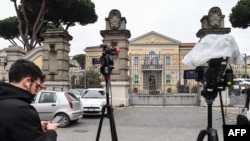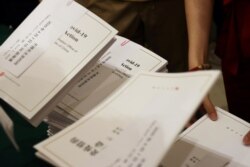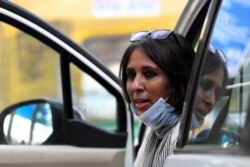Governments in more than 80 countries have used the coronavirus pandemic to justify restrictions on media freedom and peaceful protest, a report released Thursday said.
The report by Human Rights Watch looks at nearly a year’s worth of data on how governments used emergency laws, arrests, threats and restrictions to curb critics.
Journalists, bloggers, medical workers and opposition politicians were among those targeted by new, broadly worded laws on misinformation and false news; bans on media contradiction of official statistics; restrictions on access to pandemic-related data or press briefings; and other emergency measures that restricted movement or the right to protest.
Countries have the right under U.N. treaties to implement measures to protect public health and deal with public emergencies. But Human Rights Watch said it found multiple instances of governments ignoring international obligations on such matters as access to information, and it called on the U.N. Human Rights Council to investigate.
“The sheer number of governments that have passed new laws with vague and ambiguous terms to outlaw the dissemination of certain types of information is shocking,” said Gerry Simpson, associate director for the Human Rights Watch crisis and conflict division. “Penalizing speech about public health matters based on vague concepts such as ‘fake news’ is clearly not compatible with the requirement to adopt the narrowest possible restrictions necessary to protect public health.”
In China, authorities moved swiftly to detain and censor doctors, journalists and activists who first reported on the virus. Last month, Beijing announced it had investigated upward of 17,000 people for allegedly spreading false news online about the pandemic, Human Rights Watch reported.
The media watchdog Reporters Without Borders (RSF) said this week that seven journalists and online commentators were still detained or missing in China after reporting on the outbreak in Wuhan.
Only two of those — lawyer-turned-journalist Zhang Zhan and commentator Ren Zhiqiang — have stood trial. They were convicted and sentenced to prison in separate cases.
"Informing the public on this unprecedented health crisis is not a crime. These journalists should never have been arrested,” Cédric Alviani, the East Asia bureau chief for RSF, said in a statement. The international community should “increase pressure on the Beijing regime in order for it to release all jailed journalists in China and put an end to censorship."
Several countries restricted or temporarily suspended the right to access public health information, or allowed only state media or pro-government outlets to access COVID-19 briefings, the HRW report said. And at least eight took action against medical staff who spoke out against conditions.
“[These workers] are on the front line, risking their lives, and when they speak out about life-threatening shortcomings in health care response, they should get all the support they need, not get silenced to help the authorities save face,” Simpson said.
African countries accounted for the bulk of cases.
Samuel Takawira, a journalist with the Zimbabwe news website 263Chat, said he thought his arrest last year served as a warning to others in the media.
Takawira and a colleague were detained in May for allegedly breaking COVID-19 restrictions after attempting to interview three members of an opposition party being treated in a hospital for injuries allegedly caused by security forces.
Zimbabwe has dismissed the allegations against its security forces as false.
“Our arrest served as a reminder to all other journalists, media people, not to pursue the story,” Takawira told VOA. “Obviously, this was a ploy to silence people. This was a ploy by government to hinder its citizens from knowing the truth, what transpired to these ladies.”
The journalists were acquitted in September.
The government-affiliated Zimbabwe Human Rights Commission declined to comment on individual cases, but it confirmed that it had received complaints of violations that also were cited in the Human Rights Watch report and said it was monitoring those cases.
Several governments have said that emergency measures and restrictions were necessary to ensure stability, protect public health and prevent the spread of disinformation. Under international rights treaties, leaders have the right to impose limited restrictions during a public emergency.
“If people are peddling false information that could damage people’s health, governments have a right to put an end to that to protect public health, but they are only allowed to adopt limited measures that are strictly necessary to achieve that goal,” Simpson said. “They can’t just shut down entire media outlets or social media platforms or threaten to imprison anyone who contradicts the government’s line.”
The report noted that some of the restrictions imposed under the guise of limiting the spread of the virus, including on free assembly, instead were used to stifle dissent in areas not related to the pandemic.
The rights group was “shocked at the way governments have shamelessly used social distancing and other public health regulations to arbitrarily ban and break up peaceful protests,” Simpson said. “Weaponizing the pandemic for political gain is a clear breach of the right of freedom of assembly.”
Human Rights Watch wants the U.N. Human Rights Council and World Health Organization to examine how countries used emergency measures to stifle free speech to “help put an end to the abuse,” Simpson said.
Columbus Mavhunga contributed to this report.








